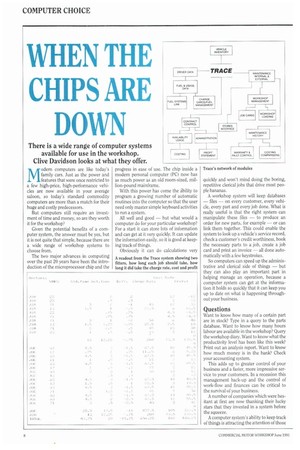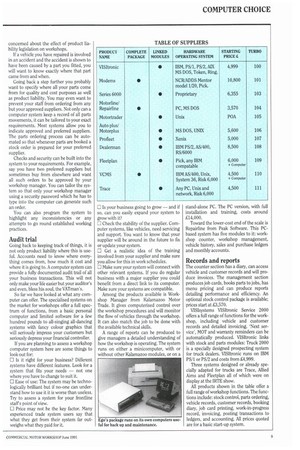WHEN THE CHIPS ARE DOWN
Page 84

Page 85

If you've noticed an error in this article please click here to report it so we can fix it.
There is a wide range of computer systems available for use in the workshop. Clive Davidson looks at what they offer.
Modem computers are like today's family cars. Just as the power and features that were once restricted to a few high-price, high-performance vehicles are now available in your average saloon, so today's standard commodity computers are more than a match for their huge and costly predecessors.
But computers still require an investment of time and money, so are they worth it for the workshop?
Given the potential benefits of a computer system, the answer must be yes, but it is not quite that simple, because there are a wide range of workshop systems to choose from.
The two major advances in computing over the past 20 years have been the introduction of the microprocessor chip and the progress in ease of use. The chip inside a modem personal computer (PC) now has as much power as an old room-sized, million-pound mainframe.
With this power has come the ability to program a growing number of automatic routines into the computer so that the user need only master simple keyboard activities to run a system.
All well and good — but what would a computer do for your particular workshop? For a start it can store lots of information and can get at it very quickly. It can update the information easily, so it is good at keeping track of things.
Obviously it can do calculations very
A readout from the Trace system showing two fitters, how long each job should take, how long it did take the charge rate, cost and profit Trace's network of modules
quickly and won't mind doing the boring, repetitive clerical jobs that drive most people bananas.
A workshop system will keep databases — files — on every customer, every vehicle, every part and every job done. What is really useful is that the right system can manipulate these files — to produce an order for new parts, for example — or can link them together. This could enable the system to look up a vehicle's service record, check a customer's creditworthiness, book the necessary parts to a job, create a job card and print an invoice — all done automatically with a few keystrokes.
So computers can speed up the administrative and clerical side of things — but they can also play an important part in helping manage an operation, because a computer system can get at the information it holds so quickly that it can keep you up to date on what is happening throughout your business.
Questions
Want to know how many of a certain part are in stock? Type in a query to the parts database. Want to know how many hours labour are available in the workshop? Query the workshop diary. Want to know what the productivity level has been like this week? Print out an analysis report. Want to know how much money is in the bank? Check your accounting system.
This adds up to greater control of your business and a faster, more impressive service to your customers. In a recession this management back-up and the control of work-flow and finances can be critical to the survival of your business.
A number of companies which were hesitant at first are now thanking their lucky stars that they invested in a system before the squeeze.
A computer system's ability to keep track of things is attracting the attention of those concerned about the effect of product liability legislation on workshops.
If a vehicle you have repaired is involved in an accident and the accident is shown to have been caused by a part you fitted, you will want to know exactly where that part came from and when.
Going back a step further you probably want to specify where all your parts come from for quality and cost purposes as well as product liability. You may even want to prevent your staff from ordering from any but your approved suppliers. Not only can a computer system keep a record of all parts movements, it can be tailored to your exact requirements. Most systems allow you to indicate approved and preferred suppliers. The parts ordering process can be automated so that whenever parts are booked a stock order is prepared for your preferred supplier.
Checks and security can be built into the system to your requirements. For example, say you have two preferred suppliers but sometimes buy from elsewhere and want all such orders to be approved by your workshop manager. You can tailor the system so that only your workshop manager using a security password which he has to type into the computer can generate such an order.
You can also program the system to highlight any inconsistencies or any attempts to go round established working practices.
Audit trial
Going back to keeping track of things, it is not only product liability where this is useful. Accounts need to know where everything comes from, how much it cost and where it is going to. A computer system can provide a fully documented audit trail of all your business transactions. This will not only make your life easier but your auditor's and even, bless his soul, the VATman's.
So far we have looked at what any computer can offer. The specialised systems on the market for workshops offer a full spectrum of functions, from a basic personal computer and limited software for a few hundred pounds to all-singing all-dancing systems with fancy colour graphics that will seriously impress your customers but seriously depress your financial controller.
If you are planning to assess a workshop computer system here are some things to look out for:
0 Is it right for your business? Different systems have different features. Look for a system that fits your needs — not one where you have to change to suit it.
0 Ease of use: The system may be technologically brilliant but if no-one can understand how to use it it is worse than useless. Try to assess a system for your frontline staffs point of view.
0 Price may not be the key factor. Many experienced trade system users say that what they get from their system far outweighs what they paid for it. 0 Is your business going to grow — and if so, can you easily expand your system to grow with it?
0 Check the stability of the supplier. Computer systems, like vehicles, need servicing and support. You want to know that your supplier will be around in the future to fix or update your system.
0 Get a realistic idea of the training involved from your supplier and make sure you allow for this in work schedules.
0 Make sure your system will connect with other relevant systems. If you do regular business with a major supplier you could benefit from a direct link to its computer. Make sure your systems are compatible.
Among the products available is Workshop Manager from Kalamazoo Motor Trade. It gives computerised control over the workshop procedures and will monitor the flow of vehicles through the workshop. It can also match the job to be done with the available technical skills.
A range of reports can be produced to give managers a detailed understanding of how the workshop is operating. The system runs on either a minicomputer, with or without other Kalamazoo modules, or on a stand-alone PC. The PC version, with full installation and training, costs around £14,000.
Toward the lower-cost end of the scale is Repairline from Peak Software. This PCbased system has five modules to it: workshop counter, workshop management, vehicle history, sales and purchase ledgers and monthly accounts.
Records and reports
The counter section has a diary, can access vehicle and customer records and will produce invoices. The management section produces job cards, books parts to jobs, has menu pricing and can produce reports detailing performance and efficiency. An optional stock control package is available; prices start at £3,570.
VISIsystems VISItronic Service 2000 offers a full range of functions for the workshop, including vehicle and customer records and detailed invoicing. 'Next service', MOT and warranty reminders can be automatically produced. VISItronic links with stock and parts modules: Truck 2000 is a specially designed prospecting system for truck dealers. VISItronic runs on IBM PS/1 or PS/2 and costs from £4,999.
Three systems designed or already specially adapted for trucks are Trace, Allied Aims and Fleetplan all of which were on display at the IRTE show.
All products shown in the table offer a full range of workshop functions. The functions include: stock control, parts ordering, vehicle records, customer records, booking diary, job card printing, work-in-progress record, invoicing, posting transactions to ledgers, and accounting. All prices quoted are for a basic start-up system.




































































































